Indika review - a dark, surreal, and devilishly playful drama
Nun's on the run.
Indika, unhelpfully for a desperately devout Orthodox nun in early 19th Century Russia, is in communion with the Devil. Or maybe she just isn't as piously pure of thought as she'd like to believe. In the slippery, shifting world of Indika (I'm talking about developer Odd Meter's wonderfully confounding platform adventure now, not the character - brace yourself for some back-and-forth there), disorientating, uneasy ambiguity reigns over all.
Which isn't to say Indika the game is afraid to commit; this is an astonishingly confident experience, so full of swagger and style, so fearless in its presentation and thematic reach, it's hard not to be immediately taken in. Indika opens very much as it means to go on, beginning not with a dreary pan across the snow-battered Russian landscape, but with a dreamy, expectation confounding interactive free-fall through an inverted world, brazenly presented in the style of a 16-bit arcade game and accompanied by a muffled, insistent cacophony of song. Then, as the miserable reality of Indika's convent snaps back into focus with a crash of metal on parquet and the first of many striking directorial decisions - here, the cutscene camera remains firmly fixed on Indika's wretched face as the world around her tilts and swirls - Odd Meter deals its next hand.
Indika the character, as becomes immediately apparent when the game relinquishes control moments in and her idle animation takes over, is an extraordinary creation. Not only is she brought to life through a wonderfully nuanced vocal performance by Isabella Inchbald (the game's English translation is consistently strong and its voice cast superb), her complex, conflicting inner life is evident just from the way she moves. She's a twitching, restless ball of nervous energy; awkwardly shifting her weight from one foot to the other, eyes darting back and forth, occasionally chewing on her fingernails or wringing her hands.
Right from the off, Indika feels like a contradiction, her earnest enthusiasm and ecclesiastical eagerness inexplicably at odds with her sisters' unwavering disdain. There's the whole 'in communion with the Devil' thing, of course - and he's a wonderful, amusingly sardonic presence throughout, sometimes narrating events, other times challenging Indika's virtue, and, increasingly, taking on the role of philosophical instigator as her world view expands. But even in the game's early moments, as it wryly funnels players through the interminable drudgery and tedium of Indika's life, the repetitive tasks, the glacial traipses through thick winter snow, something else feels off, and it's clear there's more to her character than mere demonic control.
So it's a relief for all concerned when Indika is finally turfed out into the bleak Russian winter beyond the convent's gates, tasked with delivering a letter to a distant monastery and given firm instructions not to open it as she goes. And so begins an oddball journey across a world of ceaseless fog and endless snow that's one part grim realism, one part absurdist fairytale.
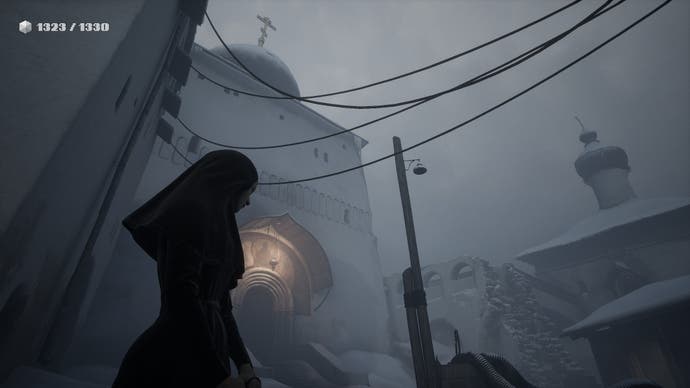
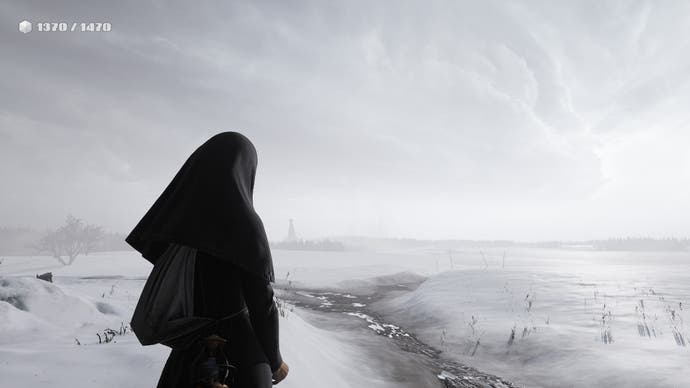
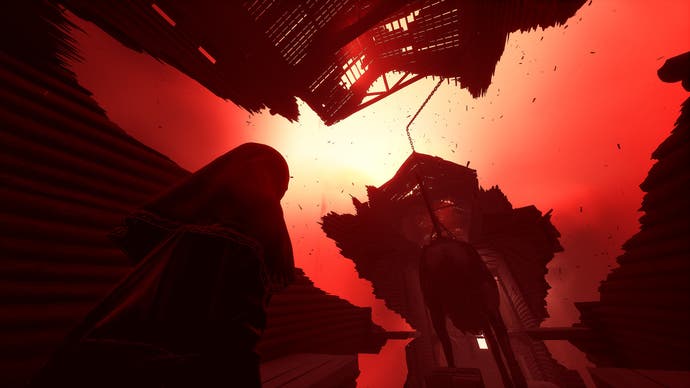
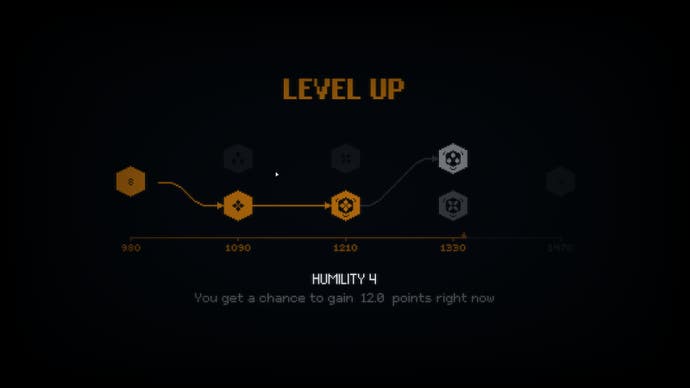
And if Indika herself is an impressive creation, the world developer Odd Meter has crafted for her travels is perhaps even more so. It's a ceaselessly bleak landscape of shifting, swirling white where rural squalor and belching industrial nightmares - vast iron bridges, looming factories, even entire cities - are painted in varying shades of fading grey, swelling and subsiding through the interminable mist like a haunted dream. And appropriately, Indika never quite fits into this world around her - the fluttering, shapeless mass of her dark habit strikingly silhouetted against the harsh white landscape only speaking further of her peculiar isolation.
But Indika the game is nothing if not wilfully unpredictable, deftly exploiting its audio-visual toolkit - those convincingly solid yet increasingly ephemeral environments, subtly defying the laws of physics, space, time, and scale; absurd camera angles gleefully underpinning the artifice of it all; a skittish soundscape churning between grinding industrial oppression and cratering abyssal silence - to create a deeply unnerving sense of dreamlike unreality.
Yet for all the weirdness around her, Indika remains a grounding force, the eerily calm epicentre in a swelling circle of violence and degradation. And the game's coldly detached yet somehow still deeply human emotional authenticity only expands once the nun crosses paths with the handsome but damaged Ilya - an escaped convict who, serving an obvious thematic mirror to Indika, believes himself to be the embodiment of a miracle from god. That's where the game's real concerns begin to crystallise, its probingly philosophical conversations soon turning to questions of love, lust, oppression and revolution, faith, free will, guilt, sin, trauma, forgiveness, and even the nature of the soul. Indika's writer and director Dmitry Svetlow has called Russia's invasion of the Ukraine an "insane crime" perpetrated by an "elderly, weak-minded dwarf", and it's hard not to see at least some modern-day parallels as the now-Kazakhstan-based Moscow developer Odd Meter's tale of youth fleeing oppressive control unfolds.
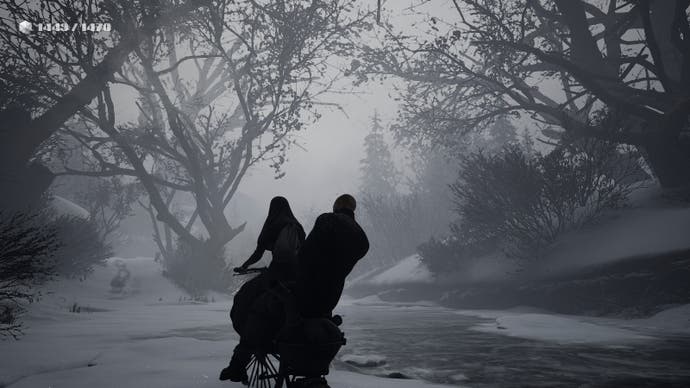
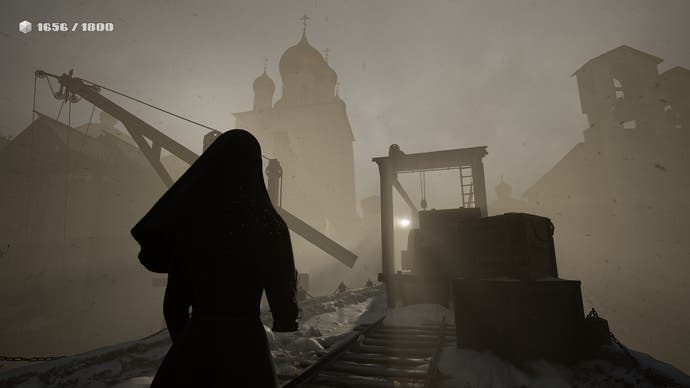
All of which probably sounds rather dour, but Indika's miraculous knife-edge balance also extends to its tone. Perhaps mercifully, Odd Meter's adventure turns out to be far more refined, far subtler than its self-consciously wacky pre-release trailers might have had you believe, but its clash of grim historical realism and flagrant absurdity is still frequently, surprisingly funny. Its parade of oddball characters, its parping, squeaking synthesiser flourishes, a wickedly sharp script, and the occasional fart joke simultaneously undercutting and accentuating the violence and horror prowling around its periphery.
Where Indika's strengths and successes are less cut-and-dry are on a more fundamental level. Indika is a fiercely linear third-person platform puzzler and not, in purely mechanical terms at least, an obviously ambitious one. For most of its runtime, its mode of choice is one of enjoyable if unremarkable crate nudging and ledge clambering, and its puzzle design, while largely satisfying, never quite matches the confident invention seen elsewhere.
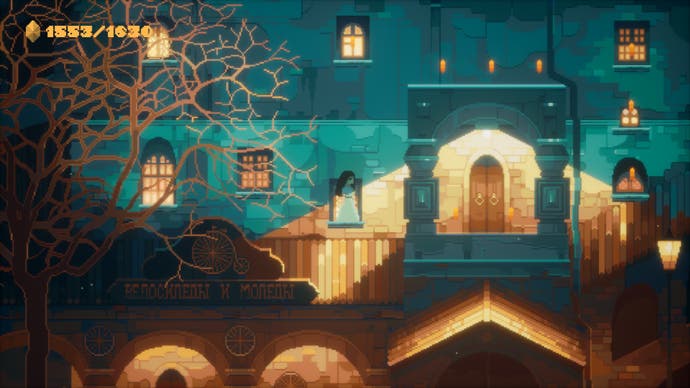
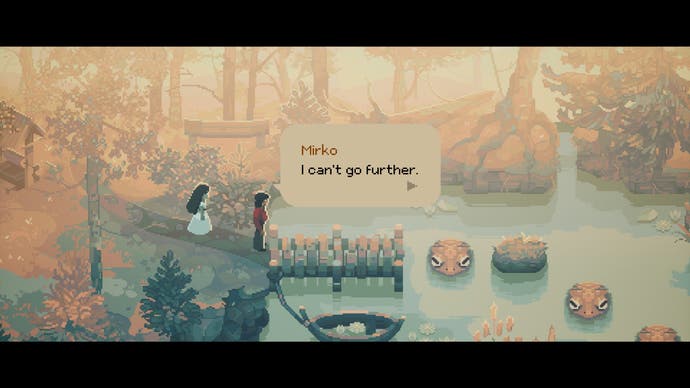
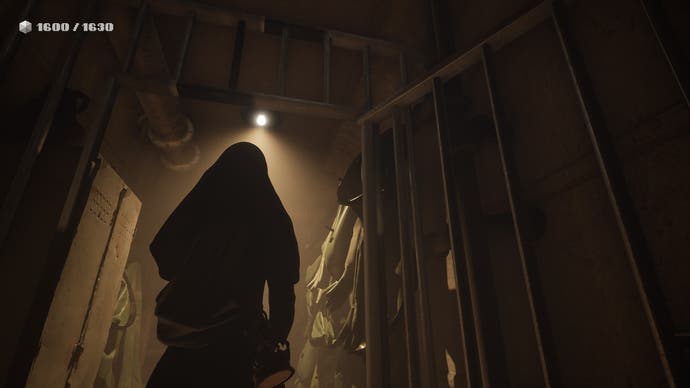
It's hard not to suspect this is at least partly intentional, however; Odd Meter is clearly, acutely aware of video game conventions and knows precisely how to exploit them for its thematic and philosophical ends. It confidently deploys sudden swerves into 16-bit arcade territory, all chip-tune melodies and chunky pixels, when it reaches for warm-hearted nostalgia in a series of flashback sequences; there's a power-up tree (utterly pointless, as a loading screen message reminds us on more than one occasion) littered with words like "grief" and "guilt", nudging Indika ever onward in her path for benediction, while "duties" are fired out like video game objectives tallying points on a scoreboard perpetually overlaid in the corner of Indika's world.
But as intentional as its unabashedly video game-y action may be (and, yes, it's hard to dismiss the endlessly amusing incongruity of a nun shimmying and shoving her way across the bleak Russian winter like Lara Croft in a wimple), it can be tough to reconcile its more obnoxious moments when you're, say, trapped in a slightly wearying trial-and-error pursuit sequence. Or stuck on an excessively elaborate lift-moving puzzle at a critical narrative juncture, or close to boiling point as you're knocked off a perch by a whirling carousel of fish for the umpteenth time.
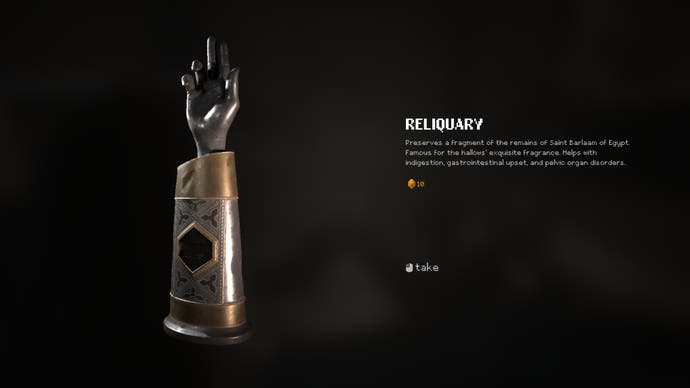
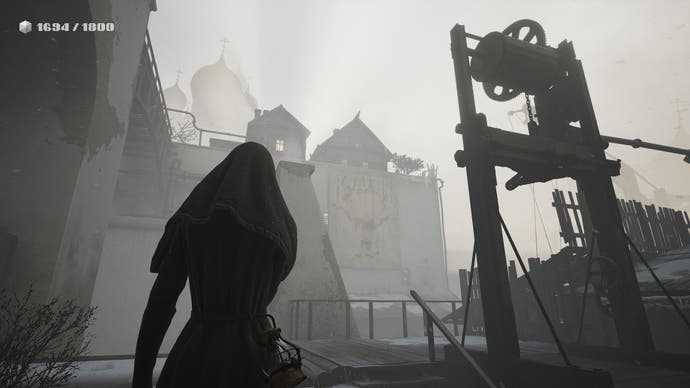

Which isn't to say there aren't flashes of genuine creative brilliance amid Indika's more familiar gameplay designs. Occasionally, for instance, as the cracks in Indika's pious shell begin to show, the world around her literally, viscerally rends in two, the fires of hell and the incessant babble of her demonic companion only abating when players follow a prompt to squeeze the controller and 'pray' - at which point normality is restored. And it's only by embracing both sides of her nature and switching between the world's two states that Indika's journey toward enlightenment, or whatever it might ultimately be, can continue. And the game's final stretch is an equally striking blend of form and function, its escalating narrative tensions leading to puzzles that stretch the boundaries of reality and possibility in strikingly inventive ways.
And, honestly, I'm not sure Indika's curiously erratic gameplay pacing - its lurches from the sublime to the rather more mundane - doesn't ultimately work in its favour as it continues to weave its disquieting spell. It is, in the end, a mood piece, a shapeshifting oddball odyssey - part grim nightmare, part Grimm fairytale - where its countless incongruities and ambiguities, its self-conscious extremities and often remarkable nuances, smash together into a preposterous, deeply affecting whole. It's at times a cold, aloof experience, but Indika's stylish abstraction and intellectual detachment unquestionably envelop a shimmeringly human heart. Don't expect answers to the big questions Indika poses, as it strides confidently, absurdly to its unforgettable denouement - as devastating in its hollowing abruptness as it is infuriating - but don't be surprised if you find yourself returning to those questions either, retracing those same feverish steps, reliving Indika's bizarre adventure, long after it's all over.
A copy of Indika was provided for review by 11 Bit Studios.


